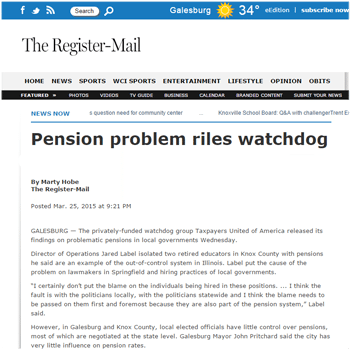Taxpayers United of America’s President, Jim Tobin, was quoted by Daily Herald in an article about active or retired education employees using elected positions to benefit their industry.
Education industry experience abounds on the Gurnee Elementary District 56 school board.
Of the seven elected positions, five seats are filled with members who are retired from school districts or employed in public education jobs. An athletic director, a retired superintendent, a substitute teacher, a retired school secretary and a teacher/administrator are on the District 56 board.
Board President James Blockinger said the community can benefit from educators in the elected positions — an opinion disputed by some taxpayer watchdogs.
Blockinger, whose career included serving as superintendent of Millburn Elementary District 24, said current or former education employees typically are open-minded and make research-based decisions.
He also said his advanced training as an administrator can lead to him posing questions to District 56 officials that may not be considered by those without his experience.
“I personally would want educators on my school board if I were not on it,” said Blockinger, who’s in the middle of a four-year term.
District 56 stood out as an extreme example in an examination of who has education industry ties on suburban school boards. The examination found:
• There are 67 board members in 44 suburban school districts who are teachers, school administrators or have worked in the education field, according to data culled from campaign information submitted to the Daily Herald in 2011 and 2013. Other school systems with a strong education industry presence include Lake Park High School District 108 in Roselle, where a teacher, retired educator and substitute instructor occupy three of seven board seats. Lombard Elementary District 44’s school board includes a former assistant principal, a substitute teacher and a school psychologist.
• Candidates in the April 7 election voluntarily identified themselves as current or retired public education employees, or noted family members in the education industry, in Daily Herald questionnaires. In 29 contested races, there are 45 candidates with those education ties, according to the information culled from the questionnaires.
• In the latest Illinois Association of School Boards survey, 87 of 1,333 members from across the state who responded said they held a public education job. Another 181 board members reported a spouse who is employed by a school district.
David From, state director of the Americans for Prosperity Illinois tax watchdog organization, said there is reason taxpayers should be concerned about public education industry employees on a school board.
With public elementary and high schools typically accounting for about two-thirds of suburban property tax bills, who’s making the decision is more significant than in other governments, From said.
“I think it does matter more, because the costs of education is the biggest driver in seemingly ever-increasing property taxes,” he explained. “This matters even more when our state has the second-highest property tax burden in the nation. The education unions encourage their members to run for these offices, driving up the cost of benefits and salaries in those districts. Those contracts are then used by the other districts as leverage and example to drive up costs in other districts. The unions have been very well-organized and effective in executing this model.”
Jim Tobin, president of Chicago-based Taxpayers United of America, said he believes school board members with education connections have a built-in bias and are less likely to make decisions with an entire community in mind.
“As a general rule, vote against anyone affiliated with the schools,” Tobin said.
However, spokesmen for the school board association and Illinois Federation of Teachers union dispute the idea that active or retired education employees use elected positions to benefit their industry.
James Russell, the statewide school board association spokesman, said there is no advantage to teachers if their peers or others with public education links hold elected posts in districts.
“I would say this: A school board member is elected to be on the management side of the negotiating team,” Russell said.
Illinois Federation of Teachers spokesman Kenzo Shibata said while there isn’t a formal push, the union may endorse candidates for school boards to ensure the voices of educators are heard. Teacher unions do not always endorse current or former members, he said, instead deciding based on local criteria.
District 56 teacher salaries contradict the idea that a school board with a heavy majority of current or retired public education employees means fatter union contracts, Shibata said. District 56 instructors’ base pay is $38,000 to $58,000 annually.
Statewide, the pay range for an elementary teacher with a bachelor’s degree on the low end was $29,906 and $87,352 at the top for school systems the size of District 56’s student enrollment of 2,212, according to the Illinois State Board of Education’s most recent 2013-14 salary study.
“Looking specifically at District 56 in Gurnee’s pay, you’ll see that teachers’ pay is modest in relation to comparable districts,” Shibata said. “It’s clear that the contract reflects good-faith compromise on both sides.”
Under state law, school board members can’t be employed by the district they represent or have a contract for services worth more than $1,000. They also can’t have a direct or indirect interest in any contract, work or business of the school district or in the sale of anything to the school district.
Meanwhile, it’s not necessarily easy to find out who has education employment connections on school boards.
Anyone interested in knowing must check county clerk offices or websites for the state-mandated statement of economic interest forms school board members and other government representatives are required by state law to complete. Willfully filing a false or incomplete statement could result in a maximum $1,000 fine and possibly up to one year in prison if convicted.
Elected officials must answer the following question on the statement of economic interest: “List the name of any unit of government which employed the person making the statement during the preceding calendar year, other than the unit or units of government in relation to which the person is required to file.”
Although family government employment connections are not specifically demanded in the form’s question, Elk Grove Elementary District 59 board member Brian Kiel noted his wife is a teacher there and a son has worked as temporary summer help.
Kiel, who is not seeking re-election, said his wife was a District 59 instructor for many years before he joined the school board. He said he was a longtime volunteer for the District 59 Education Foundation before residents suggested her run for the school board.
He said he’s avoided potential conflicts of interest by abstaining from voting on anything that would affect his wife’s income, such as contracts, and he does not participate in labor negotiations.
“My integrity is very important to me,” Kiel said. “I donate my time to the district as a community member because I believe our future is dependent on preparing all of our students to be successful for life.”
State law allows board members to represent a district where a spouse is employed. However, the Illinois Council of School Attorneys wrote in a June 2014 report that a violation of state law could occur if a board member actively promotes the spouse’s financial interests, and is advised to seek legal counsel if voting on hiring or other employment motions.
The Americans for Prosperity’s From contends legislation is needed that would prohibit anyone from holding a school board post if a spouse is employed at the same district.
He said a board member’s effectiveness could be watered down by abstaining from votes and that any decision might be construed as benefiting a spouse.
Tobin said he’d approve of a school board member whose spouse works at the same district under one condition.
“If he votes to cut the taxes, it won’t be a conflict at all,” Tobin said.

 required them to contribute 10% of their salaries to their pension plans, the state is now a lower tax state than Illinois. Wisconsin’s Tax Freedom Day is April 25, whereas the date for Illinois is April 30.”
required them to contribute 10% of their salaries to their pension plans, the state is now a lower tax state than Illinois. Wisconsin’s Tax Freedom Day is April 25, whereas the date for Illinois is April 30.”





